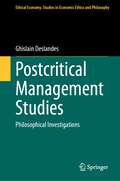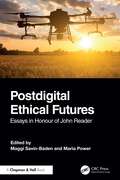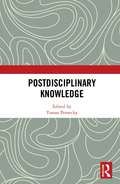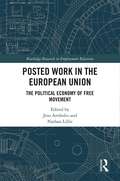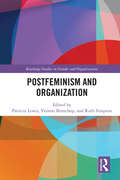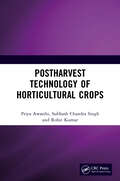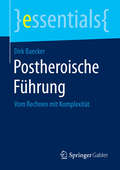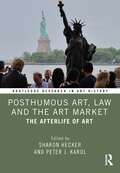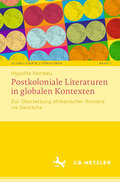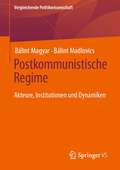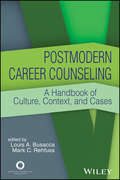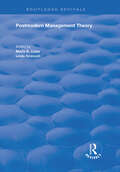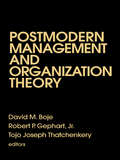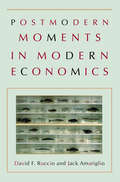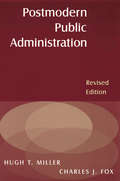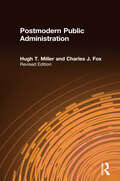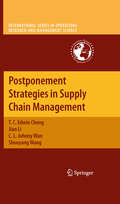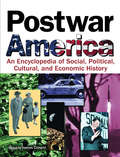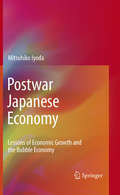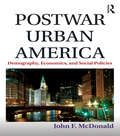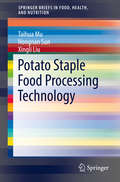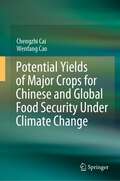- Table View
- List View
Postcritical Management Studies: Philosophical Investigations (Ethical Economy #65)
by Ghislain DeslandesThis book is the first of its kind to offer a new definition of contemporary management. It uses Michel Henry’s philosophy and takes the real, sensitive and pathetic subjectivity of individuals as the starting point of the analysis as opposed to the usual large categories of representations; resources; images; and discourses. This book thus proposes to rethink management by insisting on the dialectic of strength and vulnerability; its power of constraint, imitation and imagination; and finally its framework of action situated in a fourfold concern for the self, for people, for institutions and for the environment. These different notions are useful in order to experience a deeper understanding of management that is free from the obsolescence of the distant recommendations of ancient protomanagement and the outdated and dubious prescriptions of the so-called “scientific management”.
Postdigital Ethical Futures: Essays in Honour of John Reader
by Maggi Savin-Baden Maria PowerPostdigital Ethical Futures emerged from the work of the Ethical Futures Network hosted by the William Temple Foundation meeting both online and at Trinity College, Oxford. This book illustrates the research being carried out by some of the members of this network by examining the more practical aspects of the subject of religion and the digital, drawing on a wider range of disciplines and was created in memory of John Reader whose idea the text was, who died suddenly in 2023. This book examines issues of ethics as encountered in both the digital and environmental spheres, and seeks to cross the boundary between philosophy and theology.
Postdisciplinary Knowledge
by Tomas PerneckyPostdisciplinary Knowledge is the first book to articulate postdisciplinarity in philosophical, theoretical and methodological terms, helping to establish it as an important intellectual movement of the twenty-first century. It formulates what postdisciplinarity is, and how it can be implemented in research practice. The diverse chapters present a rich collection of highly creative thought-provoking essays and methodological insights. Written by a number of pioneering intellectuals with a range of backgrounds and research foci, these chapters cover a broad spectrum of areas demonstrating alternative ways of producing knowledge. Essays are interspersed with dialogue, encouraging a comprehensive and engaging discussion on this emerging movement. Not limited to a specific field or discipline, this will be of great interest to upper-level students and researchers in a wide range of subject areas, including: tourism, sociology, education, psychology, physiotherapy, fine arts, architecture and design, as well as those with a general interest in epistemology and methodology.
Posted Work in the European Union: The Political Economy of Free Movement (Routledge Research in Employment Relations)
by Jens Arnholtz Nathan LillieFocusing on posting of workers, where workers employed in one country are send to work in another country, this edited volume is at the nexus of industrial relations and European Union studies. The central aim is to understand how the regulatory regime of worker "posting" is driving institutional changes to national industrial relations systems. In the introduction, the editors develop a framework for understanding the relationship of supra-national EU regulation, transnational actors and national industrial relations systems, which we then apply in the empirical chapters. This unique volume brings together scholars from diverse academic fields, all of whom are experts on the topic of "worker posting." The book examines different aspects of the posting debate, including the interactions of actors such as labour inspectorates, trade unions, European legal/political regulators, manpower firms, transnational subcontractors and posted workers. The main objective of this book is to explore the dynamics of institutional change, by showing how trans- and supra-national dynamics affect European industrial relations systems. This volume will represent the "state of the art" in research on worker posting. It will also contribute to debates on European integration, social dumping, labour market dualization and precariousness and will be of value to those with an interest employment relations, law and regulation.
Postfeminism and Organization (Routledge Studies in Gender and Organizations)
by Ruth Simpson Patricia Lewis Yvonne BenschopThis edited book inserts postfeminism (PF) as a critical concept into understandings of work and organization. While the notion of PF has been extensively investigated in cultural and media studies, it has yet to emerge within organization studies - remaining marginal to understandings of work based experiences and subjectivities. Understanding PF as a discursive cultural context not only draws on an established epistemological orientation to organizations as discursively constructed and reproduced but allows us to highlight how PF may underpin and be underpinned by other discursive regimes This book, as the first in the field, draws on key international authors to explore: the contextual ‘backdrop’ of PF and its links with neo-liberalism, transnational feminism and other hegemonic discourses; the different ways in which this backdrop has infiltrated organizational values and practice through the primacy attached to choice, merit and individual agency as well as through the widespread perception that gender disadvantage has been ‘solved’; and the implications for organizational subjectivity and for how inequality is experienced and perceived. This book introduces postfeminism as a critical concept with contemporary importance for the study of organizations, arguing for its explanatory potential when: Exploring women’s and men’s experience of managing and organizing; Investigating the gendered aspects of organizational life; Analysing the contemporary validation of the feminine and the associated feminization of management/leadership and organizations; Tracing the emergence of new femininities and masculinities within organizational contexts. The book is ideal reading for researchers working in the area of Gender and Organization Studies but is also of interest to researchers in the areas of Cultural Studies, Media Studies, Women’s Studies and Sociology.
Postgirot Bank and Provment AB: Managing the Cost of IT Operations
by F. Warren Mcfarlan Nancy BartlettDescribes a specific approach for measuring the efficiency of the groups of computers inside an organization and suggests ways this tool may be used to reduce the company's computing investment while maintaining service. It is a software-enabled industrial engineering approach to delivery of computing resources. The evolution of this approach and the listing of its strengths and weaknesses is the key purpose for the class discussion.
Postharvest Technology of Horticultural Crops
by Rohit Kumar Subhash Chandra Singh Priya AwasthiThis book is an informative introduction to the post-harvest technology of horticultural crops, and their conservation and management. The different post-harvest handling operations including storage aspects are also covered. Innovative processing technologies like high-pressure processing, irradiation, cold plasma technique and ohmic heating are also discussed in the book.
Postheroische Führung: Vom Rechnen mit Komplexität (essentials)
by Dirk BaeckerDirk Baecker erläutert den Unterschied zwischen einem heroischen, auf Eindeutigkeit zielenden und einem postheroischen, mit verteilten Strukturen rechnenden Führungsverständnis. Erich Gutenbergs Begründung der Betriebswirtschaftslehre wird als Beispiel für eine Abstraktion diskutiert, die Management und Führung in der Organisation beherrschen müssen, um sie fallweise und zielführend aufheben zu können. Das Management dosiert die Unterwerfung des Betriebs unter die Anforderungen der Wirtschaft, die Führung die Unterwerfung des Betriebs unter die Anforderungen der Gesellschaft. Beides sind Moderationstechniken, die mit den robusten Eigenstrukturen der Organisation rechnen müssen. Als Beispiel für solche Eigenstrukturen wird die fraktale Größe von Gruppen diskutiert, die an verschiedenen Typen von Organisationen nachgewiesen werden konnten. Der Beitrag plädiert für eine interdisziplinäre Organisationsforschung, um einem nicht trivialen Verständnis von Führung näherzukommen.
Posthumous Art, Law and the Art Market: The Afterlife of Art (Routledge Research in Art History)
by Sharon HeckerThis book takes an interdisciplinary, transnational and cross-cultural approach to reflect on, critically examine and challenge the surprisingly robust practice of making art after death in an artist's name, through the lenses of scholars from the fields of art history, economics and law, as well as practicing artists. Works of art conceived as multiples, such as sculptures, etchings, prints, photographs and conceptual art, can be—and often are—remade from original models and plans long after the artist has passed. Recent sales have suggested a growing market embrace of posthumous works, contemporaneous with questioning on the part of art history. Legal norms seem unready for this surge in posthumous production and are beset by conflict across jurisdictions. Non-Western approaches to posthumous art, from Chinese emulations of non-living artists to Native American performances, take into account rituals of generational passage at odds with contemporary, market-driven approaches. The book will be of interest to scholars working in art history, the art market, art law, art management, museum studies and economics.
Postkoloniale Literaturen in globalen Kontexten: Zur Übersetzung afrikanischer Romane ins Deutsche (Globalisierte Literaturen. Theorie und Geschichte transnationaler Buchkultur / Globalized Literatures. Theory and History of Transnational Book Culture #7)
by Hypolite KembeuFragen des Kulturtransfers und insbesondere des ideologischen Einflusses auf Übersetzungen bilden das Untersuchungsfeld des vorliegenden Buches. Es widmet sich der Rezeption afrikanischer Literaturen während und in der Folge des Kalten Krieges in Deutschland. Ausgehend von literatursoziologischen und postkolonialen Übersetzungstheorien und damit verbundenen analytischen Ansätzen geht der Autor anhand von Rezeptionsprozessen und Übersetzungen den konkreten Strategien der Rekontextualisierung von postkolonialen afrikanischen Literaturen nach. Dabei werden auch die unterschiedlichen sozialhistorischen und -politischen Faktoren in der BRD und DDR sowie nach der Wiedervereinigung betrachtet. Diese kontextualisierte Untersuchung der Literaturrezeption erfolgt anhand der Werke vieler afrikanischer Autoren, insbesondere des Kameruners Ferdinand Oyono, des Kenianers Ngũgĩ Wa Thiong’o, des Nigerianers Chinua Achebe und des Ivorers Ahmadou Kourouma. Die Analyse zeigt, dass das Idealbild vom ideologiefreien Kulturtransfer der Realität nicht standhält, da die Übersetzung, sei es bei der Auswahl der zu übersetzenden Texte oder auch bei den Übersetzungsstrategien der ausnahmslos europäischen Übersetzer, sich als ein gesellschaftsbezogenes und ideologisch geprägtes Konstrukt herausstellt. Die für das Übersetzen oft postulierte interkulturelle Kommunikation und internationale Partnerschaft weist demnach ein bedeutendes asymmetrisches Machtverhältnis zwischen Zivilisationen auf, dessen Ursache nicht sprachlicher, literarischer oder künstlerischer, sondern eher geopolitischer Natur ist.
Postkommunistische Regime: Akteure, Institutionen und Dynamiken (Vergleichende Politikwissenschaft)
by Bálint Magyar Bálint MadlovicsIn 120 Thesen entwickelt das Buch einen konzeptionellen Rahmen mit einer Typologie post-kommunistischer Regime und einer detaillierten Darstellung von idealtypischen Akteuren und den politischen, wirtschaftlichen und sozialen Phänomenen in diesen Regimen. Befreit von den impliziten Annahmen der Mainstream-Demokratisierungstheorie liefert die neue Terminologie ein leicht verwendbares Instrumentarium eindeutiger Ausdrucksmittel, um über den Postkommunismus zu sprechen.
Postmodern Career Counseling: A Handbook of Culture, Context, and Cases
by Louis A. Busacca Mark C. RehfussThis practiced-based handbook describes postmodern career counseling models and methods designed to meet clients’ diverse needs in today’s challenging work environment. Readers will gain a solid understanding of the theoretical underpinnings of postmodern career counseling and learn practical approaches to counseling clients of various ages and backgrounds on occupational choice and other issues, such as coping with developmental tasks, career transitions, and work traumas. Drawing directly from their experiences with clients, career counseling experts link theory to practice in 17 application chapters that demonstrate the process of postmodern career assessment and intervention embedded in culture and context. Multicultural case vignettes and a “Practical Application Guide” in each of these chapters facilitate classroom learning and discussion. *Requests for digital versions from the ACA can be found on wiley.com. *To request print copies, please visit the ACA website here: https://imis.counseling.org/store/detail.aspx?id=78124 *Reproduction requests for material from books published by ACA should be directed to permissions@counseling.org
Postmodern Management Theory (Routledge Revivals)
by Marta B. Calás Linda SmircichFirst published in 1997, this volume asks: when was ‘The Postmodern’ in the History of Management Thought? Marta B. Calás and Linda Smircich have chosen this subtitle as entry point to the collection for several reasons. The first, and most evident, is that it prompts us to reflect on the inclusion of a volume on postmodern organization studies within a series of books on the history of management thought. What does such inclusion signal? Are we saying that we are past the postmodern in organization studies? That we have transcended modernity and, beyond, postmodernity? Similar to other social sciences, organization and management studies in the Anglo-American and European academy became impressed by the styles of ‘postmodernism’ and their epistemological companions, ‘poststructuralisms’, during the 1980s. For this collection we have selected twenty two journal articles, published between 1985 and 1996, that we consider emblematic of postmodern endeavours in management thought, as they further our understanding of how ‘truth’ (of any paradigmatic persuasion), is fashioned through particular discourses and other signifying practices. Taken together, these articles address the following questions: What has the field accomplished through attempts at being postmodern? With what consequences? And, where does the field stand now, if it is still/already (going) after ‘the postmodern’? In our view ‘the postmodern’ cannot transcend modern management thought; it is, rather, part of it. Nevertheless, the mere appearance of efforts towards making the field ‘postmodern’ makes it important to account for them in the history of the field. Such is the narrative that we are trying to portray in this volume.
Postmodern Management Theory (Routledge Revivals)
by Marta B. Calás Linda SmircichFirst published in 1997, this volume asks: when was ‘The Postmodern’ in the History of Management Thought? Marta B. Calás and Linda Smircich have chosen this subtitle as entry point to the collection for several reasons. The first, and most evident, is that it prompts us to reflect on the inclusion of a volume on postmodern organization studies within a series of books on the history of management thought. What does such inclusion signal? Are we saying that we are past the postmodern in organization studies? That we have transcended modernity and, beyond, postmodernity?Similar to other social sciences, organization and management studies in the Anglo-American and European academy became impressed by the styles of ‘postmodernism’ and their epistemological companions, ‘poststructuralisms’, during the 1980s.For this collection we have selected twenty two journal articles, published between 1985 and 1996, that we consider emblematic of postmodern endeavours in management thought, as they further our understanding of how ‘truth’ (of any paradigmatic persuasion), is fashioned through particular discourses and other signifying practices.Taken together, these articles address the following questions: What has the field accomplished through attempts at being postmodern? With what consequences? And, where does the field stand now, if it is still/already (going) after ‘the postmodern’? In our view ‘the postmodern’ cannot transcend modern management thought; it is, rather, part of it. Nevertheless, the mere appearance of efforts towards making the field ‘postmodern’ makes it important to account for them in the history of the field. Such is the narrative that we are trying to portray in this volume.
Postmodern Management and Organization Theory
by David Boje Dr Robert P Gephart Tojo Joseph ThatchenkeryThis thought-provoking critique of postmodern theory provides an overview of issues as they relate to management and organization theory and its history, and assembles a variety of important works on postmodern philosophy - including feminist and cultural postmodern philosophies. Addressing the future of the postmodern influence on management and organization theory and method, the book also establishes an agenda for future research.
Postmodern Moments in Modern Economics
by David F. Ruccio Jack AmariglioOf all the areas of contemporary thought, economics seems the most resistant to the destabilizing effects of postmodernism. Yet, David Ruccio and Jack Amariglio argue that one can detect, within the diverse schools of thought that comprise the discipline of economics, "moments" that defy the modernist ideas to which many economists and methodologists remain wedded. This is the first book to document the existence and to explore the implications of the postmodern moments in modern economics. Ruccio and Amariglio begin with a powerful argument for the general relevance of postmodernism to contemporary economic thought. They then conduct a series of case studies in six key areas of economics. From the idea of the "multiple self" and notions of uncertainty and information, through market anomalies and competing concepts of value, to analytical distinctions based on gender and academic standing, economics is revealed as defying the modernist frame of a singular science. The authors conclude by showing how economic theory would change if the postmodern elements were allowed to flourish. A work of daring analysis sure to be vigorously debated, Postmodern Moments in Modern Economics is both accessible and relevant to all readers concerned about the modernist straightjacket that has been imposed on the way economics is thought about and practiced in the world today.
Postmodern Public Administration
by Hugh T Miller Charles J FoxThis widely acclaimed work provides a lively counterbalance to the standard assessment-measurement-accountability prescriptions that have made showing you did your job more important than actually doing it. Now extensively revised, it articulates a postmodern theory of public administration that challenges the field to redirect its attention away from narrow, technique-oriented scientism, and toward democratic openness and ethics. The authors incorporate insights from thinkers like Rorty, Giddens, Derrida, and Foucault to recast public administration as an arena of decentered practices. In their framework, ideographic collisions and everyday impasses bring about political events that challenge the status quo, creating possibilities for social change. "Postmodern Public Administration" is an outstanding intellectual achievement that has rewritten the political theory of public administration. This new edition will encourage everyone who reads it to think quite differently about democratic governance.
Postmodern Public Administration
by Hugh T. MillerThis widely acclaimed work provides a lively counterbalance to the standard assessment-measurement-accountability prescriptions that have made showing you did your job more important than actually doing it. Now extensively revised, it articulates a postmodern theory of public administration that challenges the field to redirect its attention away from narrow, technique-oriented scientism, and toward democratic openness and ethics.The authors incorporate insights from thinkers like Rorty, Giddens, Derrida, and Foucault to recast public administration as an arena of decentered practices. In their framework, ideographic collisions and everyday impasses bring about political events that challenge the status quo, creating possibilities for social change. "Postmodern Public Administration" is an outstanding intellectual achievement that has rewritten the political theory of public administration. This new edition will encourage everyone who reads it to think quite differently about democratic governance.
Postponement Strategies in Supply Chain Management
by T. C. Cheng C. L. Wan Jian Li Shouyang WangWithin supply chain management (SCM), postponement is a deliberate action to delay final manufacturing or distribution of a product until receipt of a customer order. This reduces the incidence of wrong manufacturing or incorrect inventory deployment. Postponement strategies and practices serve to reduce the anticipatory risk in a supply chain. It can be fine-tuned or staged so that only the generic parts shared by a firm's various end products are warehoused, used only once orders come in for whichever products are selling, and will reduce inventory pressures throughout the firm. Despite much existing research in the area, no one book devoted solely to postponement has been published. At its core, Postponement Strategies in Supply Chain Management analyzes how both pull postponement strategy and form postponement strategy can be leveraged to yield substantial benefits to adopting firms in different competitive environments. The book is intended for researchers in supply chain management interested in conducting in-depth studies on postponement strategies. It is also intended for practitioners trying to understand the workings of postponement strategies and looking for guidance and decision support for the implementation of postponement strategies. Therefore, the book can be useful not only for researchers but also for practitioners and graduate students in operations management, management science, and business administration.
Postwar America: An Encyclopedia of Social, Political, Cultural, and Economic History
by James CimentFrom the outbreak of the Cold War to the rise of the United States as the last remaining superpower, the years following World War II were filled with momentous events and rapid change. Diplomatically, economically, politically, and culturally, the United States became a major influence around the globe. On the domestic front, this period witnessed some of the most turbulent and prosperous years in American history. "Postwar America: An Encyclopedia of Social, Political, Cultural, and Economic History" provides detailed coverage of all the remarkable developments within the United States during this period, as well as their dramatic impact on the rest of the world. A-Z entries address specific persons, groups, concepts, events, geographical locations, organizations, and cultural and technological phenomena. Sidebars highlight primary source materials, items of special interest, statistical data, and other information; and Cultural Landmark entries chronologically detail the music, literature, arts, and cultural history of the era. Bibliographies covering literature from the postwar era and about the era are also included, as are illustrations and specialized indexes.
Postwar Japanese Economy
by Mitsuhiko IyodaSince the end of World War II, the Japanese economy has seen rapid changes and remarkable progress. It has also experienced a bubble economy and period of prolonged stagnation. The book seeks to address three major questions: What kind of changes have taken place in the postwar years? In what sense has there been progress? What lessons can be drawn from the experiences? The book is organized as follows: It begins with an overview of the postwar Japanese economy, using data to highlight historical changes. The four major economic issues in the postwar Japanese economy (economic restoration, rapid economic growth, the bubble economy and current topics) are addressed, with particular focus on the meaning of economic growth and the bubble economy. The next chapters examine the important economic issues for Japan related to a welfare-oriented society, including income distribution, asset distribution, and the relative share of income. Another chapter deals with the household structure of Japan, the pension issue, and the importance of the effect of demographic change on income distribution. The final chapter gives a brief summary, examines quality of life as a lesson of this research, and briefly outlines a proposal for a basic design towards achieving a high satisfaction level society. This book will be of interest to economists, economic historians and political scientists and would be useful as a text for any course on the Japanese economy.
Postwar Urban America: Demography, Economics, and Social Policies
by John F. McDonaldThis unique and inexpensive book provides a demographic and economic history of urban America over the last 65 years. The growth and decline of most northern cities is contrasted with the steady growth of western and southern cities. Various urban government policies are explored, including federal, state, and local policies. There is a chapter focusing on Detroit and its rapid decline toward bankruptcy and its recent strategies to slow recovery. The final two chapters speculate on what's next for urban America and gives suggestions for stimulating growth.
Potato Staple Food Processing Technology
by Taihua Mu Hongnan Sun Xingli LiuThis book introduces readers to volatile compounds of staple foods, while also systematically highlighting the processing technologies of potato staple foods, which will be of great importance in promoting the virtuous circle and structural upgrading of Potato consumption patterns are gradually changing from fresh to processed formulations, (e. g. mashed potatoes, potato chips, etc. ) as a result of fast food habits adopted from developed countries. If the potato can be used to make staple foods, it will not only provide energy, but also nutrition. Though the book is primarily intended for researchers and students in the field of food technology, it will also be of interest to commercial research staff in food technology.
Potential Growth of Australia and New Zealand in the Aftermath of the Global Crisis
by Yan SunA report from the International Monetary Fund.
Potential Yields of Major Crops for Chinese and Global Food Security Under Climate Change
by Chengzhi Cai Wenfang CaoThis book analyzes potential yields of six major food crops - rice, wheat, maize, potato, soybean and rapeseed worldwide using both qualitative and quantitative approaches to study both China’s and global food security under climate change. Firstly, it reviews previous studies on potential yields of rice, wheat, maize, potato, soybean and rapeseed worldwide to provide a detailed information of studying on China’s and global food security based on the product’s supply and demand of these crops. Secondly, average and top (national) yields of rice, wheat, maize, potato, soybean and rapeseed since 1961 on global scale are employed to analyze their temporal and spatial variation trends and potential limits. Thirdly, the effects of global warming in climate change on both average and top yields of rice, wheat, maize, potato, soybean and rapeseed since 1961 at global level are analyzed using regression model, and their differences between average and top yields among these crops are identified and compared. Fourthly, the yields and per capita quantity of rice, wheat, maize, potato, soybean and rapeseed in major producer-countries and the world are analyzed to assess the situation and trend of international trade for the products of these crops, respectively.Fifthly, potential yields of rice, wheat, maize, potato, soybean and rapeseed worldwide by 2030 are projected using both trend-regressed models and ARIMA models to estimate the per capita quantity of these crops based on the projection of world population and assess the status of Chinese and global food security in that future. Finally, it provides policy implications and advice on food security for China and the world directing food production by 2030 under climate change.
